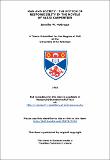Files in this item
Man and society : the notion of responsibility in the novels of Alejo Carpentier
Item metadata
| dc.contributor.advisor | Bacarisse, Salvador | |
| dc.contributor.author | McGregor, Jennifer W. | |
| dc.coverage.spatial | 371 | en_US |
| dc.date.accessioned | 2015-02-17T11:26:16Z | |
| dc.date.available | 2015-02-17T11:26:16Z | |
| dc.date.issued | 1982 | |
| dc.identifier | uk.bl.ethos.516897 | en_US |
| dc.identifier.uri | https://hdl.handle.net/10023/6114 | |
| dc.description.abstract | The aim of this thesis is to investigate the highly moral ethic of social duty and responsibility which animates the work of Alejo Carpentier. In order to examine this theme, I have studied, in particular, the following six novels: ‘El reino de este mundo’, Los pasos perdidos’, ‘El acoso’, El siglo de las luces’, ‘El recurso del método’, and ‘La consagración de la primavera’. In the Introduction, I have investigated the various philosophical questions raised by the concept of responsibility : the debate about freewill and determinism has been examined, and the Existentialist philosophy of Jean-Paul Sartre has been chosen as the most helpful in an investigation of Carpentier’s theory of responsibility, due to a great coincidence of thought between the two writers. The protagonists of the novels in question have been grouped according to various distinguishing tendencies or characteristics, and have been analysed in the light of the Sartrian concepts of good and bad faith. These groupings are as follows: “the deluded intellectual”, “two tyrants”, “the lesson of experience”, and “the committed individual”. The success, or failure, of these characters, in matching up to the goals of self-transcendence and responsible commitment posed by Carpentier has been charted throughout Chapters One to Four, and deductions have been made about the various forms of bad faith in which the characters indulge. The conclusions that I have drawn from this detailed investigation of characters in good and bad faith are, firstly, that Carpentier sees man’s goal in life as the attainment of self-knowledge and the honest acceptance of responsibility for the self : once this state of good faith has been achieved, man is able to commit himself to the never-ending struggle for the improvement of the social situation. Acceptance of responsibility for the self is vital, in Carpentier’s canon, for without such acceptance, positive commitment is impossible. Secondly, I have concluded that, according to Carpentier, commitment is an inevitable part of life, and that Carpentier’s goal, then, is that we should actively commit ourselves to a positive cause through recognition of our responsibility for ourselves and our society, rather than tacitly accept the status quo through a passive or deterministic attitude. | en_US |
| dc.language.iso | en | en_US |
| dc.publisher | University of St Andrews | |
| dc.rights | Creative Commons Attribution-NonCommercial-NoDerivatives 4.0 International | |
| dc.rights.uri | http://creativecommons.org/licenses/by-nc-nd/4.0/ | |
| dc.subject.lcc | PQ7389.C263Z5M4 | |
| dc.subject.lcsh | Carpentier, Alejo--Criticism and interpretation | en_US |
| dc.subject.lcsh | Carpentier, Alejo--Ethics | en_US |
| dc.subject.lcsh | Responsibility in literature | en_US |
| dc.subject.lcsh | Social action--Moral and ethical aspects | en_US |
| dc.subject.lcsh | Existentialism | en_US |
| dc.subject.lcsh | Sartre, Jean-Paul, 1905-1980 | en_US |
| dc.subject.lcsh | Philosophy, Marxist, in literature | en_US |
| dc.subject.lcsh | Cuba--History--Revolution, 1959--Literature and the revolution | en_US |
| dc.title | Man and society : the notion of responsibility in the novels of Alejo Carpentier | en_US |
| dc.type | Thesis | en_US |
| dc.type.qualificationlevel | Doctoral | en_US |
| dc.type.qualificationname | PhD Doctor of Philosophy | en_US |
| dc.publisher.institution | The University of St Andrews | en_US |
This item appears in the following Collection(s)
Except where otherwise noted within the work, this item's licence for re-use is described as Creative Commons Attribution-NonCommercial-NoDerivatives 4.0 International
Items in the St Andrews Research Repository are protected by copyright, with all rights reserved, unless otherwise indicated.


